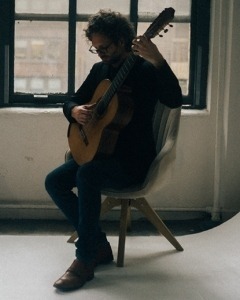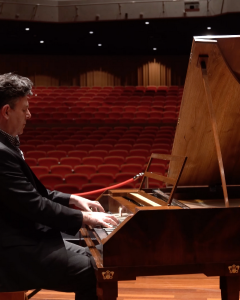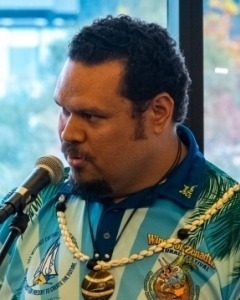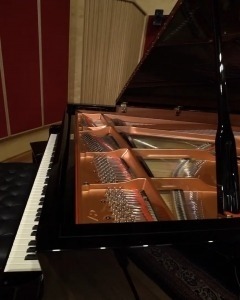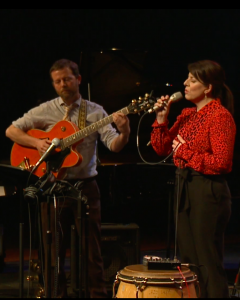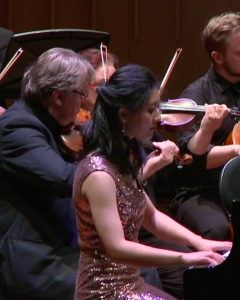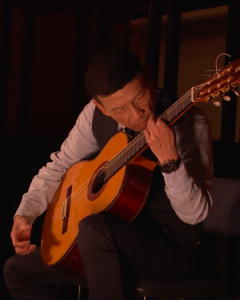School of Music Love Supreme Grant Recipient Announced
SHARE

Congratulations to Ronan Apcar who is the recipient of the ANU School of Music 2024 Love Supreme Grant.
Established to provide a fellowship opportunity to a recent graduate with a demonstrated track record in music excellence and achievement, the $25,000 prize supports the recipient to embark on a project that develops their artistic practice to an international level.
Graduating top of his class from a Bachelor of Music (Performance & Composition) in 2021, Ronan is an accomplished pianist and composer, having released his debut album Dulcie Holland Crescent the same year and composing more than 30 songs over the past 9 years.
“This is the largest grant or prize I’ve ever received, so I’m very overjoyed but I also slightly feel the pressure.” He said. “Because this is a project-based grant, I feel like this gives me confidence and is an affirmation that I do have something of value to contribute. It kind of feels like kudos for all the different projects I’ve been throwing myself at and trying out over the last couple years.”
He recalls the moment he found out the good news, “I was floating around the Abbotsford Convent in Melbourne when I saw the email and I took a seat in the middle of some staircase to reread the email!”
Passionate about music genres from jazz, avant-garde and classical to house, where else would Ronan’s passion for music have begun but with Dr Kawashima’s Brain Training on Nintendo DS. “When I was growing up the Nintendo DS was released and one of the first games that came out was Dr Kawashima’s Brain Training. There was a piano player part of that game where you had to tap the keyboard on screen as the game played through the sheet music. From memory, not only did I really enjoy it, but I was really good at it too!” He recalled.
“So I decided to try and play these songs from the DS on the ‘real thing’ - which was the piano my dad had in the house.”
From that time as an 8-year-old child, Ronan has had a self-proclaimed ‘unorthodox’ music journey, unlearning bad habits by attending the Sydney Conservatorium of Music High School. “Growing up I played both classical and jazz piano, trumpet, and studied composition, mostly doing whatever I wanted without any curriculum (sorry AMEB!) but with some very generous and patient teachers.”
“During my time at the ANU, I started to really focus on modern and contemporary music (particularly by Australians), eventually stumbling into the experimental and improvised world, and also had my first forays into interdisciplinary collaborations.”
Recent interdisciplinary works that include; a collaboration with Polyphonic Pictures on an audiovisual artwork based on The Fire Sermon by Einojuhani Rautavaara, Skin, an audiovisual work for string quartet and soundscape made from processed recordings of skin being scratched and rubbed, and Reset, featuring Ronan's live improvisations in response to a video work and DJ set by producer Lustwell.
As he furthers his studies at the Australian National Academy of Music in Melbourne he remarked, “I see this grant as the start of a lifelong project. I’ve long been wanting to start developing a new practice that used electronic and digital instruments to either combine with or move away from the acoustic piano, but the problem has been both time and money.
“With this grant, I’m able to afford both the equipment and also the time to sit and work out how the ideas in my head actually look and sound. Once that’s settled, I’ll build on it for the rest of my life - it’s just starting that’s always the hard part, so this grant was just what I needed!
“I trust that the projects I’ll stumble into down the track because of this grant will give me a really rich and fulfilling musical career - to me, that’s the only real goal I have. I don’t really operate with clear objectives like a certain prize, job, or recognition, instead I just like to try everything and see what happens!”
For more information on the award click here and to explore more of Ronan’s work click here.
The original article is published on ANU College of Arts and Social Sciences.





